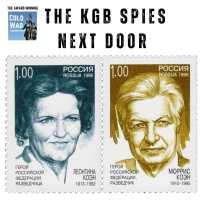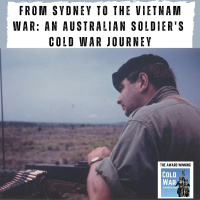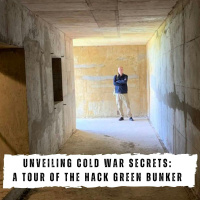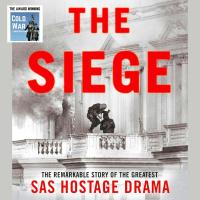Synopsis
In conversation with those that experienced the Cold War and those who are fascinated.
Episodes
-
Bombs, Berlin & Peacekeeping: A Paratrooper's Cold War Story Pt 1 (383)
11/01/2025 Duration: 01h02minDavid Mackay is a former Cold War special forces officer and author of Bubbleheads, SEALs and Wizards: America's Scottish Bastion in the Cold War. He returns by popular demand to share his compelling journey through military service in the British Army's Parachute Regiment. From his humble beginnings in Scotland to his experiences in the Parachute Regiment, David recounts tales of courage, leadership, and the harsh realities of conflict. Hear about his time in Northern Ireland, the challenges and adventures of United Nations Peacekeeping in Cyprus, and service in Cold War Berlin. Discover how these experiences shaped his perspective on life, leadership, and the world. Join me for an unforgettable exploration of military life and its enduring impact. All our combat episodes in one convenient playlist https://open.spotify.com/playlist/6j6YJmRWzt42kYiPGkcFfa?si=95e5366e4ad945a3 Buy David's book here https://uk.bookshop.org/a/1549/9781849955546 Episode extras here https://coldwarconversations.com/episode
-
Watching the Jackals: Prague's Covert Liaisons with Cold War Terrorists and Revolutionaries (382)
04/01/2025 Duration: 01h08minAuthor Daniela Richterova new book "Watching the Jackals" tells the untold history of Czechoslovakia's complex relations with Middle Eastern terrorists and revolutionaries during the closing decades of the Cold War In the 1970s and 1980s, Prague became a favourite destination for the world's most prominent terrorists and revolutionaries. They arrived here to seek refuge, enjoy recreation, or hold secret meetings aimed at securing training, arms, and other forms of support. While some were welcomed with open arms, others were closely watched and were eventually ousted. Watching the Jackals is the untold history of Czechoslovakia's complex relations with Middle Eastern terrorists and revolutionaries during the closing decades of the Cold War. Based on recently declassified intelligence files, Richterova unveils the story of Prague's engagement with various factions of the Palestine Liberation Organization, along with some of the era's most infamous terrorists, including Carlos the Jackal, the Munich Olympics
-
The Truth about the Gulf of Tonkin incident that sparked the Vietnam War (381)
28/12/2024 Duration: 58minThe Gulf of Tonkin incident, was a pivotal moment that escalated U.S. involvement in the Vietnam War. I talked with US Marine Veteran John F. Davies, who researched the Gulf of Tonkin Incident. He shares a personal connection and insights on the political and military decisions that led to one of America's most controversial conflicts. Discover the intricate dance of diplomacy, military strategy, and political manoeuvring that shaped this critical historical period. All our combat episodes in one convenient playlist https://open.spotify.com/playlist/6j6YJmRWzt42kYiPGkcFfa?si=95e5366e4ad945a3 Episode extras here https://coldwarconversations.com/episode381/ The fight to preserve Cold War history continues and via a simple monthly donation, you will give me the ammunition to continue to preserve Cold War history. You’ll become part of our community, get ad-free episodes, and get a sought-after CWC coaster as a thank you and you’ll bask in the warm glow of knowing you are helping to preserve Cold War his
-
Under Fire: A Journalist's Story of the 1989 Romanian Revolution (380)
21/12/2024 Duration: 46minToday we are transported back to a pivotal moment in history that occurred 35 years ago this month - the Romanian Revolution of 1989. This episode is from our archive and features, Mark Brayne, a former Reuters and BBC journalist, who provides a gripping first-hand account of the tumultuous events that led to the fall of Nicolae Ceausescu. As Mark recounts his experiences, listeners are given a rare glimpse into the life of a journalist reporting from a war zone. He embarks on a perilous journey to Bucharest, navigating roadblocks and dodging bullets to report on the revolution. His determination to capture the story amidst chaos and danger is a testament to the courage and resilience of journalists who risk their lives to bring us the news. Beyond the historical events, Mark shares personal reflections on how these experiences shaped his life and career. The emotional intensity of covering such significant moments led him to a new path as a psychotherapist, helping others navigate their own traumas. Th
-
Foes to Friends: Cold War British and East German Tank crew together in conversation (379)
14/12/2024 Duration: 01h34minJoin our East-West tank crew reunion that offers a rare glimpse into the lives of those who served on opposite sides of the Iron Curtain. The episode features Al and Mick, former Chieftain tank crew members from the British Army, alongside Dag, an ex-East German T72 tank commander. Together, they delve into their personal experiences, providing insights into the military strategies, challenges, and camaraderie that defined their service during the Cold War. As the discussion unfolds, the trio explores the intricacies of military life, from the training regimes and unit cohesion to the technical specifications of their respective tanks. Dag provides an intriguing account of the T72's capabilities, highlighting its strengths and limitations. Meanwhile, Al and Mick reflect on their experiences with the Chieftain tank, offering a Western perspective on tank warfare during the Cold War. The episode is punctuated with personal anecdotes and reflections, adding depth and humanity to the historical narrative. Dag
-
From Vulcan Bases to Communist Bucharest: A Tale of Cold War Intrigue (378)
07/12/2024 Duration: 01h10minRon Mackay further recounts his experiences in Romania, a country teetering between Soviet influence and a desire for independence, offering a fascinating glimpse into a time of uncertainty and intrigue. Among many stories, Ron visits an RAF base in the UK where his brother was a crew member of a Vulcan bomber, Britain’s nuclear deterrent at the time. The RAF quizzes Ron in detail about the locations he has visited in Romania. Back in Romania Ron navigates the intricacies of its society and shares stories of friendships forged under the watchful eyes of the Securitate, Romania's feared secret police. Ron describes his interactions with various characters, each with their own motivations and secrets. From a duck shooting party at a Communist Party hunting lodge to a tense encounter with tanks near the Soviet border, Ron's stories are filled with suspense and unexpected twists. Buy Ron's book here and support CWC https://amzn.to/3Om8kZt Episode extras here https://coldwarconversations.com/episode378/ Rela
-
Surveillance and shortages: A British teacher in 1960s Cold War Communist Romania (377)
30/11/2024 Duration: 01h03minIn 1967 a young British professor found himself in Bucharest, Romania, under the most intriguing circumstances. Ron Mackay shares his fascinating experiences as he navigated life and teaching in a communist country. When he set foot on Romanian soil, he was met with challenges and intrigue. The stark realities of life under a communist regime painted a picture of a world vastly different from his own. Yet, amidst the restrictions, he found beauty in the Romanian culture, architecture, and the resilience of its people. Despite the oppressive environment, his students were eager to learn and engage, offering him a glimpse into their lives and aspirations. The lack of resources and the ever-present surveillance added complexity to his teaching experience. The episode also explores his adventures beyond the classroom, from navigating the bustling streets of Bucharest to travelling through the picturesque Romanian countryside, his encounters with locals, fellow expatriates, and even a mysterious British engine
-
Mission Iran: Special Forces Berlin & Operation Eagle Claw, JTF 1-79 (376)
23/11/2024 Duration: 49minFew operations in Cold War history capture the imagination quite like Operation Eagle Claw. I have the privilege of welcoming back James Stejskal, a Special Forces veteran, to delve into the intricacies of this audacious mission. Operation Eagle Claw, was conceived as a daring rescue mission to free 52 US embassy staff being held hostage held in Iran. James was a member of Detachment A, a clandestine unit tasked with gathering intelligence and preparing for the mission. James reveals the undercover operations in Tehran, where operatives navigated hostile territory with nothing but their wits and false identities. The operation itself was fraught with difficulties from the onset and James walks us through the intricate phases of the mission, from the rendezvous at Desert One to the audacious plan to storm the embassy and foreign ministry in Tehran. He captures the sense of urgency and the meticulous planning that went into every detail, highlighting the commitment of those involved. For those intrigued by
-
Den of Spies: The October Surprise - A Covert Cold War Operation (375)
16/11/2024 Duration: 43minIn the late 1970s, the United States found itself at the centre of a crisis where 52 US Embassy staff were held hostage in Iran. Our latest episode takes you on a journey through the tumultuous events of 1980, exploring the covert operation known as the “October Surprise” that allegedly influenced the outcome of the U.S. presidential election. William Casey is at the heart of this story, a brilliant yet enigmatic figure who played a pivotal role in the Reagan campaign. Described as a master spy, Casey is said to have orchestrated a complex web of secret meetings and illegal arms sales, all aimed at manipulating 52 American hostages held captive in Iran to Ronald Reagan’s advantage. Our guest, Craig Unger an investigative journalist with decades of experience, has written a new book on the subject Den of Spies: Reagan, Carter, and the Secret History of the Treason That Stole the White House. Buy the book here and support CWC https://bookshop.org/a/92195/9780063330603 Episode extras here https://coldwarc
-
Surrounded and captured in the Korean War (374)
11/11/2024 Duration: 01h25minToday is Veterans Day in the US and Armistice Day in the UK and to commemorate I’ve gone back into the archive to remember and share vivid testimony from Korean War veteran Tommy Clough who sadly passed away a couple of weeks ago. The Korean War was among the most destructive conflicts of the modern era, and one of the few times when the Cold War turned hot. There were approximately 3 million war fatalities and a larger proportional civilian death toll than World War II or the Vietnam War. Tommy Clough is one of the last surviving of the battle of the Imjin River and was just 19 when the Gloucestershire Regiment were cut off from their brigade by more than 10,000 Chinese troops in 1951. Outnumbered and surrounded, they dug in on a hilltop for three days, repelling attack after attack until their ammunition ran out. The battle of the Imjin River was one of the most famous of the Korean War We hear in detail Tommy’s experiences in the days up to the battle, as well as the desperate fighting to hold off the C
-
Interview with an East German Border Guard (373)
09/11/2024 Duration: 01h14minToday is the 35th anniversary of the Berlin Wall and East German border opening in the autumn of 1989. In this riveting episode, I speak with Dietmar Schultke, a member of the Grenztruppen, the East German Border Guards and delve into the life of those responsible for preventing escapes over the Berlin Wall and the East German Border. Dietmar opens up about his life in the GDR, sharing personal stories of his recruitment into the border troops, the rigorous training he endured, and the psychological pressures he faced during his service. Training in Eisenach prepared him for a potential third World War, with exercises in sharpshooting, combat, and gas mask drills. The psychological toll of such training was immense, as soldiers were constantly under surveillance, with one in ten being a Stasi informant. The cultural impact of the time was not lost on Dietmar. He vividly recalls attending a Bruce Springsteen concert in East Berlin, an event that felt like a taste of freedom amidst the oppressive regime.
-
From Vulcan to Gannet: A Cold War career in the Royal Air Force
02/11/2024 Duration: 58minThis episode is brought to you by the Avro Heritage Museum at Woodford near Manchester where I am a volunteer. Trevor Jackson is also one of the volunteers, but unlike me he’s a former Vulcan pilot who shares with me his extraordinary career. From his early days with the Royal Air Force Cadet Force to flying iconic aircraft like the BAC Jet Provost, Folland Gnat , Vulcan, Gannett, and Canberra, Trevor provides fascinating insights into the life of a military aviator. Discover the challenges and thrills of flying during the Cold War, the intricacies of Vulcan QRA scrambles, and landing on the pitching, heaving deck of an aircraft carrier. This episode is a must-listen for aviation enthusiasts and history buffs alike! I highly recommend the Avro Heritage Museum. They’re the home of the only white Vulcan in the World as well as many other historical aircraft and cockpits. Visit the web site at https://www.avroheritagemuseum.co.uk/ for more details. Episode extras https://coldwarconversations.com/episode372
-
Doorsteps of Hell - a US Marine platoon commander in the Vietnam War (371)
25/10/2024 Duration: 01h23minAs Tom Williams fought the enemy, every day, without fail, he would record the day’s events in his diary. It is these diaries (which Tom has to this day), that enable him to tell the story of Vietnam in the late sixties/early seventies, like it really was. I talk with Tom about his book “Doorsteps of Hell” where he offers an honest, unembellished account of a new officer in the US Marines - fighting and surviving in the mud-sucking rice paddies and leech-infested jungles of Vietnam. In my conversation Tom brings to life the camaraderie, leadership, and the very essence of military expertise. Tom’s book is available at heartofamarineseries.com . Episode extras https://coldwarconversations.com/episode371 The fight to preserve Cold War history continues and via a simple monthly donation, you will give me the ammunition to continue to preserve Cold War history. You’ll become part of our community, get ad-free episodes, and get a sought-after CWC coaster as a thank you and you’ll bask in the warm glow of knowi
-
How the Cold War almost destroyed European Football (370)
18/10/2024 Duration: 44minIn the late 1960s European club football competitions were thriving However unexpected events in 1968 threatened its survival. I delve into the fascinating world of European football during the Cold War era with Craig McCracken, a self-described peddler and purveyor of quasi obscure retro football nostalgia via the 'Beyond The Last Man' blog. We explore the political tensions that influenced European football in the 1960s, and the dramatic events of 1968 when the Prague Spring was crushed by Soviet and Warsaw Pact forces. Discover how these geopolitical events impacted clubs like Celtic, the Milan clubs, and Real Madrid, and the unprecedented decisions UEFA had to make. This episode is a gripping tale of football, politics, and the power struggles that shaped the beautiful game. Episode extras https://coldwarconversations.com/episode370 Craig's excellent blog https://beyondthelastman.com/ All our Cold War Sport episodes in one convenient playlist https://open.spotify.com/playlist/2OoAtLN7sHYdCgCNhms1Kl
-
Nuclear Missions - a Canadian CF104 Starfighter Pilot's Story (369)
11/10/2024 Duration: 01h11minFlying at high speed and low level, RCAF pilot Allen French was at the sharp end of potential nuclear bombing missions during the Cold War. Born at the dawn of the baby boomer era, Allen delves into his early inspirations, his father's service in the Royal Canadian Air Force, and the pivotal moments that led him to join the Air Force. From training on the Canadair CT-114 Tutor to flying the iconic F-86 Sabre and CF-104 Starfighter, Allen shares firsthand accounts of Cold War tensions, nuclear deterrence strategies, and the challenges of high-speed, low-level navigation across Europe. Around 50% of over 200 Canadian Starfighters were lost in accidents. You’ll hear about Allen’s near-death experience at a West German airbase and many other personal anecdotes that bring history to life. Thanks to Bernardo Scheliga who put me in contact with Allen. He and Allen are volunteers at the Canadian Museum of Flight. You can find details here https://canadianflight.org/ Episode extras https://coldwarconversat
-
The KGB Spies Next Door (368)
04/10/2024 Duration: 01h04minIn the sleepy suburb of Ruislip in London during the late 1950s, life was anything but exciting for Gay Search, a 15-year-old girl. Little did she know, her mundane existence was about to be shattered by a shocking revelation that would turn her world upside down. This is the gripping tale of suburban espionage, the story begins with the seemingly ordinary Kroger family—Helen and Peter—who live just a stone's throw away from Gay. However, beneath their friendly facade lay a dark secret. The Krogers were, in fact, Soviet spies, part of the infamous Portland Spy Ring. Episode extras https://coldwarconversations.com/episode368 All our spy episodes in one convenient playlist https://open.spotify.com/playlist/40wb3AyJ6oUep10YKXLhtm?si=c72eba540bee4ba4 The fight to preserve Cold War history continues and via a simple monthly donation, you will give me the ammunition to continue to preserve Cold War history. You’ll become part of our community, get ad-free episodes, and get a sought-after CWC coaster as a than
-
From Sydney to the Vietnam War: An Australian Soldier's Cold War Journey (367)
27/09/2024 Duration: 01h19minIn this gripping episode of Cold War Conversations, we hear the remarkable first-hand account of John Brooker, an Australian veteran who takes us on a journey from the streets of Sydney to the battlefields of Vietnam. John shares his experiences from joining the Citizens Military Force (CMF) to his deployment with the Royal New South Wales Lancers and the regular army. He provides vivid details of the Tet Offensive of 1968, the intense firefights, and the harrowing experience of being mortared for the first time. John also reflects on the challenges of returning to civilian life and the mixed reception from the Australian public and World War II veterans. Don't miss this powerful and insightful episode! Related episodes Vietnam War draftee to US Army Ranger https://pod.fo/e/10388d Just another day in Vietnam https://pod.fo/e/ac3e7 Don – Vietnam War Armoured Cavalry Platoon Leader https://pod.fo/e/a08dc Cold War Tank Tales from the Land Down Under https://pod.fo/e/2078b9 Further Cold War Tank
-
Unveiling Cold War Secrets: Hack Green Regional Seat of Government Bunker museum (366)
20/09/2024 Duration: 01h22minIt's 40 years since the film Threads was shown on British TV. It portrayed the effects of a nuclear attack on the city of Sheffield, England and the eventual long-term effects of nuclear war on civilization. It therefore seems apt to publish a tour I had of the Hack Green Regional Seat of Government Bunker museum. Nestled in the heart of Cheshire, Hack Green Nuclear Bunker is a hidden gem that offers a fascinating glimpse into the Cold War era. I had the pleasure of exploring this historical site with Rod Siebert who originally bought the bunker and volunteer David Smith, who shared their extensive knowledge and passion for this remarkable place. The bunker contains many unique artefacts such as the largest public collection of nuclear weapons casings in Europe, including Polaris, Trident, Chevaline and WE 177, the UK's last airdrop nuclear deterrent. Other rare and unique items include the Queen's transition to war telephone, which would have been used by the UK government to communicate with Buckingha
-
The Siege: The Remarkable Story of the Greatest SAS Hostage Drama with Ben Macintyre (365)
13/09/2024 Duration: 01h11minOn April 30, 1980, six heavily armed gunmen burst into the Iranian embassy on Princes Gate, overlooking Hyde Park in London. There they took 26 hostages, including embassy staff, visitors, and three British citizens. I talk with Britain’s bestselling historian Ben Macintyre who has written a new book called “The Siege: The Remarkable Story of the Greatest SAS Hostage Drama”. The book details the tense six-day siege ensued as millions gathered around screens across the country to witness the longest news flash in British television history, in which police negotiators and psychiatrists sought a bloodless end to the standoff, while the SAS – hitherto an organisation shrouded in secrecy – laid plans for a daring rescue mission: Operation Nimrod. Drawing on unpublished source material, exclusive interviews with the SAS, and testimony from witnesses including hostages, negotiators, intelligence officers and the on-site psychiatrist, bestselling historian Ben Macintyre takes readers on a gripping journey from th
-
From Sheffield to Sandhurst: A Cold War Territorial Soldier's Memories (364)
06/09/2024 Duration: 01h04minChris is a former member of the Yorkshire Volunteers, part of Cold War Britain’s Territorial reserve Army. This episode is a treasure trove of personal anecdotes, historical insights, and reflections on military life, making it a must-listen for anyone interested in military history and the Cold War era. Chris’s journey into the military began with his interest in military subjects and history. He joined the Army Cadet Force before university and later, the Officer Training Corps at Sheffield University. As a reserve unit, training included handling World War II vintage weapons including the venerable Bren gun. Chris’s training involved long days and nights of exercises and lectures. He recalls an incident at the School of Infantry in Warminster where he inadvertently came under live fire. Despite his initial lack of physical prowess, Chris’s perseverance and dedication saw him through, eventually leading to his decision to pursue a commission as an officer. After training and assessment at Sandhurst, Chris

































